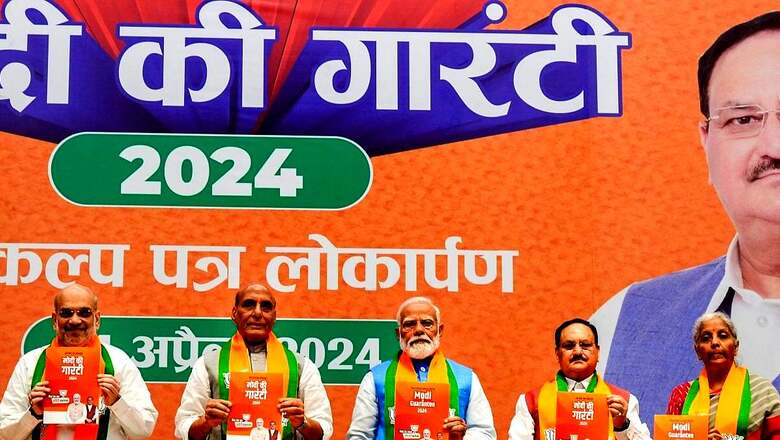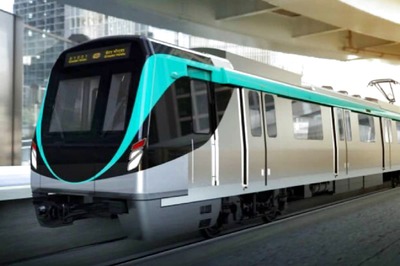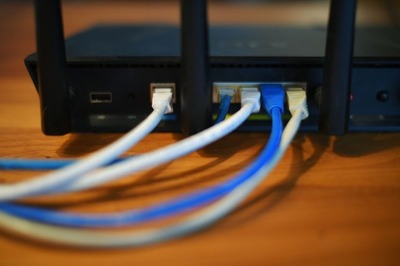
views
The Bharatiya Janata Party (BJP) always employs a distinctive approach in the election strategy. It adopts a bottom-up approach, actively seeking suggestions from the grassroots level and considering them at the highest level. These suggestions are then implemented, ensuring a two-way communication channel through their dedicated karyakartas spread across the entire nation.
The party initiated its campaign for 2019 by inviting suggestions for its election manifesto, setting it apart from other political parties where manifestos were decided by a select few at the top. The BJP prioritised the voices of their karyakartas, enabling their input in the manifesto preparation process. This approach ensured that the manifesto truly represented the aspirations of the people. To facilitate this, over 7500 suggestion boxes were placed in 4000 assembly constituencies and later transported to Delhi using 300 buses and raths. This crowdsourcing of ideas guaranteed that the common man always had a say in governance.
Under the leadership of Rajnath Singh, a manifesto committee was formed to compile the received suggestions and finalise the manifesto. Additionally, 15 sub-committees were established to categorise the ideas under different headings. The 2019 manifesto was spread over 45 pages and under 13 sub-headings. This extensive document, formulated after a detailed discussion with party workers, was faithfully implemented by the party.
The emphasis on the ‘Nation first’ approach, with a strong focus on national security, was evident right from the early versions of Bharatiya Jana Sangh’s manifesto. National security and integration has been crucial for the BJP.
Our ambition to become the world’s third-largest economy was hindered by the two years of the Covid wave that swept the globe. But against adversaries’ projections, we grew to become the world’s fifth-largest economy with one of the largest forex reserves in the world. While the world economy was reeling under the pandemic, our robust domestic consumption helped our economy to grow. Significant progress was made in infrastructure development. The country’s healthcare capabilities received global recognition for our response to the pandemic, and through vaccine diplomacy, we showcased our empathy for humanity, deeply rooted in our Hindutva ideology.
Various policies were introduced to significantly enhance farmers’ income as promised in the manifesto of 2019. The Information Technology (IT) sector witnessed remarkable growth, enabling us to provide efficient governance. The past five years have fulfilled the aspirations of India’s youth, instilling confidence and leading to a surge in startups founded by them. The majority of India’s 1.25 lakh startups are now led and staffed by young individuals.
Women’s empowerment formed the cornerstone of the government’s policy-making, with a record-high gender budget and legislative changes aimed at empowering women at all levels. Our government’s commitment to women has resulted in the creation of numerous successful female entrepreneurs, and providing our women with a life of dignity and pride. The education sector experienced rapid growth with the establishment of colleges and universities. Extensive skilling programs were implemented at school and college levels to prepare our youth for future challenges.
Our rich cultural heritage was revitalised through various projects and schemes, such as the development of the Ayodhya Ram Mandir and Kashi Vishwanath corridor, the preservation of Buddhist heritage, the strengthening of Sikh ties, and many others. Narendra Modi 2.0 successfully revived our lost heritage and culture. Our foreign policy enabled us to become champions of global diplomacy. Through the successful conduct of events such as the G20, India moved into the next layer of global diplomacy. Our cultural diplomacy was enhanced and gone were the days when we bent our knees towards any global power.
Thus the 2019 manifesto, which was delivered in letter and spirit by our government, was readily a reckoner of what was about to come in 2024, a roadmap to Viksit Bharat.
Fast forward to 2024
Fast forward to 2024, with nearly all promises fulfilled from its 2019 manifesto and with over 25 million Indians now lifted out of absolute poverty, the time was ripe to reclaim India’s rightful position in global affairs. Consequently, there arose a necessity to harness the potential of technology to gather inputs for the creation of the manifesto. A distinguished committee was established, under the leadership of Rajnath Singh as the Chairman, to oversee the development of this crucial document, which would serve as the party’s vision for the upcoming five years. Nirmala Sitharaman assumed the role of the committee’s convenor, while Piyush Goyal served as the co-convenor. The committee consisted of 27 members, and it received approximately 400,000 suggestions through the NaMo app, along with around one million suggestions via video channels, resulting in a total of approximately 1.5 million suggestions from various sources.
These suggestions were meticulously examined by the committee, originating from the general public, and compiled into the final document, which was unveiled on April 14, 2024. The 2024 manifesto encompasses 24 sections, including 10 sections dedicated to social issues.
The overarching theme of the manifesto revolves around the ‘Modi Ki Guarantee’, symbolising the trust that the general public now places in our prime minister.
Nowhere in the document is there any mention of unrealistic promises or promises that could hinder the economic growth of the state. The document also does not mention the concept of ‘divide and rule’ which certain other parties put forth in their manifesto. The 2024 BJP manifesto directly acknowledges the fact that our nation’s remarkable growth in the past decade is a result of the significant socio-economic transformation experienced by various groups such as women, farmers, fishermen, street vendors, small entrepreneurs, SC, ST, and OBC communities, thanks to technology-driven governance solutions. The BJP manifesto reaffirms its belief in only four castes, namely the poor, youth, women, and farmers.
To begin with, the manifesto reiterates its dedication to assisting the underprivileged by expanding the reach of existing programs such as PM Awas Yojana, Ujjwala Yojana, Garib Kalyan Anna Yojana, Ayushman Bharat Yojana, and others. Additionally, it pledges to provide free electricity to those in need by expanding the use of solar power. Furthermore, the manifesto emphasises the empowerment of women through the concept of Viksit Bharat, where women take the lead in various sectors and Viksit Bharat becomes women-led. The socio-economic and political support for women aims to bring about significant changes in our society.
For the youth, the manifesto promises increased transparency in public exams and endeavours to harness the energy of young individuals to propel our nation to global heights. It also pledges to provide funding and mentorship for startups, as well as creating more job opportunities for the youth. Lastly, the manifesto maintains its commitment to farmers by supporting Kisan families and enabling them to lead better lives. Existing schemes such as Fasal Bima Yojana and PM KISAN Yojana will be strengthened, and the minimum support price (MSP) will be gradually increased. Crop diversification and natural farming will be promoted, with a focus on promoting millet as a superfood nationwide. Efforts will be made to position India as a hub for nutritious food globally. Additionally, there will be a significant emphasis on the fisheries and dairying sectors, which will further enhance farmers’ income.
The country’s economic output is greatly influenced by the aspirations of the neo-middle class, and therefore, it is crucial to support them through various schemes and programs. The manifesto thrusts on the need to create and nurture a silver economy, where it prioritises the well-being of our senior citizens by utilising the benefits of technology in their care. The manifesto promises to make efforts to facilitate pilgrimage for our elderly population. The manifesto is committed to providing the best opportunities and ensuring ease of working for all, including gig workers, truck drivers, porters, domestic workers, and street vendors.
This time, more focus is being given to MSMEs, small traders, and Vishwakarmas, which will contribute to overall inclusive development. The manifesto also emphasises the importance of uplifting tribal communities and improving their socio-health indicators, as well as empowering them economically. In terms of foreign policy, the manifesto’s goal is to make India a global friend (Vishwa Bandhu). This they plan to achieve by actively engaging with the Global South, neighbouring countries, and other multilateral forums, and by being the first to respond in times of crisis. There is also an assurance that every effort shall be made to make India a permanent member of the United Nations. It is expected to expand our global presence through diplomatic engagements and leverage our proud cultural identity.
Thiruvalluvar cultural centres are being planned to be established worldwide, promoting the teachings of Saint Tiruvallur’s Thirukkural, which is widely read across the globe for its wisdom on virtue, wealth, and love. The manifesto talks about spreading the legacy of Lord Ram globally. Preserving and promoting the legacy of Lord Ram will be a unique way to connect with countries around the world and exemplify that modern Ram Rajya has finally arrived in India under PM Modi.
National and internal security are non-negotiable priorities for the BJP. The Modi government has consistently upheld this policy since 2014. By modernising military commands and enhancing border infrastructure, the BJP aims to strengthen our country’s military preparedness. Additionally, there is a commitment to bolster forensic infrastructure and to combat drug-related crimes, which will contribute to a significant reduction in crime rates nationwide. The manifesto deeply values the contributions of honest taxpayers in pursuit of India becoming the third-largest economy and promises to duly recognise their efforts.
India under Modi aspires to become a leading global manufacturing hub and a nation known for its innovative products. The manifesto commits to actively promote defence and railway manufacturing in line with our prime minister’s vision, as well as expand the aviation and shipbuilding industries. Furthermore, the manifesto expects us to play a major role in the extraction and development of strategic minerals. To achieve this, it is expected to prioritise electric vehicle manufacturing, semiconductor production, and chip industries, as these minerals are essential for these sectors. The BJP’s vision includes the creation of world-class infrastructure across all sectors in Bharat and the promotion of ease of living in cities by ensuring that our cities are sustainable for the future. Thematic tourism circuits are being planned, which will boost tourism.
While good governance will be emphasised, civil reforms are also being planned to be initiated. The implementation of a Uniform Civil Code (UCC) is a pressing need felt by India’s minorities, and the BJP’s commitment to establish the same has been made in this manifesto. Once voted to power, the party is committed to making ‘One Nation, One Poll’ a reality, which will lead to fiscal consolidation while giving greater fiscal independence to local self-governments.
Health and quality education are fundamental pillars of the BJP manifesto, and the party plans to continue to prioritise these areas. There is also an aim to make India one of the world’s top sporting nations and also bid for international sporting events such as the Olympics. The BJP has outlined its plan to advance technology and innovations, as well as to establish a sustainable Bharat by giving priority to the environment. Therefore, it is evident that the BJP manifesto for 2024 is not just an empty promise, nor is it a document that will financially burden our country with unrealistic giveaways. Instead, it is a practical and forward-thinking document which will make sure that a developed India is a reachable goal.
Adarsh Kuniyillam is a Parliamentary, policy and political analyst from Kerala. He has supported various Members of Parliament in Parliamentary works. Views expressed in the above piece are personal and solely that of the author. They do not necessarily reflect News18’s views.



















Comments
0 comment